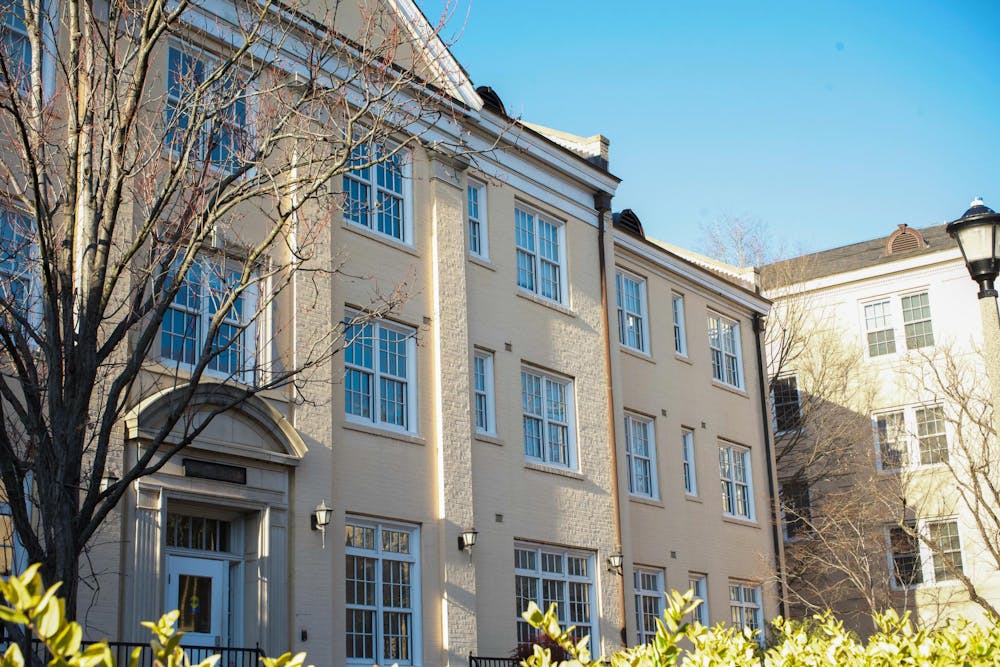USC's residence hall Maxcy is set to become a Living & Learning Community and resource center for first-generation college students this fall, establishing a supportive community.
The center will be a resource in Maxcy College for the 21% of the on-campus student population at USC who identifies as first-generation. The center, which will be available to all first-generation students regardless if they live in the residence hall, will provide services such as University 101 courses, advising and a student success center.
Lara Anderson, the interim vice provost for undergraduate students, said she hopes that the First-Generation Living & Learning Community and resource center will help students take advantage of the opportunities higher education has to offer, such as earning scholarships, participating in research or studying abroad.
Maxcy will house roughly 100 incoming and 50 returning students in the fall. Applications are open for first-generation students to qualify for the community. Living & Learning Communities are residence halls for students with similar academic or personal interests that are advised by USC faculty and staff. The First-Generation Living & Learning Community will be the 14th LLC added to the university.
Maxcy houses the Global Fellows Living & Learning Community for students interested in world cultures, which is relocating to South Quad Residence Hall in the summer.
Executive Vice President for Academic Affairs and Provost Donna Arnett, a former first-generation college student, said she hopes the new community will help ease the college transition process for USC's first-generation students.
“We don’t want it to be a stigma of being first-gen,” Arnett said. “But you also don’t know what you don’t know when you’re a first-gen student because your family has never been through this process of coming into a big four-year college."
One of the most crucial factors in a successful Living & Learning Community is having a faculty director to help form connections with students and build a community, Arnett said. The university is reviewing applications of candidates who hope to help lead the First-Generation Living & Learning Community for the position of faculty director.
Arnett said she hopes that the First-Generation Living & Learning Community and resource center will not only help individual students but also benefit the community socially and economically.
“We know that when a first member of a family gets a degree, it raises the social status income of that family,” Arnett said. “So it has downstream effects for the family, which has downstream effects for the community. We really want to grow South Carolina."
The First-Generation Living & Learning Community and resource center should provide students the confidence they need to assume leadership responsibilities, Assistant Provost for Graduation and Retention Shelley Dempsey said.
“When I’ve looked back at my own history and my career, I’ve looked at leaders, and then you think, ‘Oh, I think I might be able to do that or enjoy doing that,'” Dempsey said. “So we’re hoping and planning that some of that will take place and that we’ll be able to actually consider how many of the students stepped into leadership roles for future semesters."
The university will research the success of the first-generation center using an insight survey, Dempsey said. She said it's important to note potential areas of improvement and apply them to the rest of the student population to make their transition into college easier as well.
“They (first-generation students) have earned the opportunity to be a Gamecock,” Dempsey said. “When they get here, we want to make sure that we are continuing to celebrate that with them and providing the supports they need."

Anderson said she’s excited to launch the community's mentoring program. Six to eight students who are majoring in the same subject may join a mentor group that is guided by a faculty member, a graduate student and possibly an alum.
“Whether that’s with peers, whether that’s with alum who are first-gen, whether that’s with faculty who are first-gen,” Anderson said, “We’ll have lots of opportunities for people who are passionate about first-gen or who are first-gen or have been first-gen students themselves to participate in the community."
The university is bringing in help from six committees made up of students, faculty and staff that will brainstorm what else is needed in the community and resource center to make them successful, Anderson said.
“We just can’t wait to welcome students into the community and to support them in different ways through their interaction and engagement with each other, with faculty members and with the director of the new first-gen Living & Learning Community," Anderson said.
A ribbon-cutting ceremony to celebrate the opening of the First-Generation Living & Learning Community and resource center will take place on Aug. 22 at Maxcy College.

